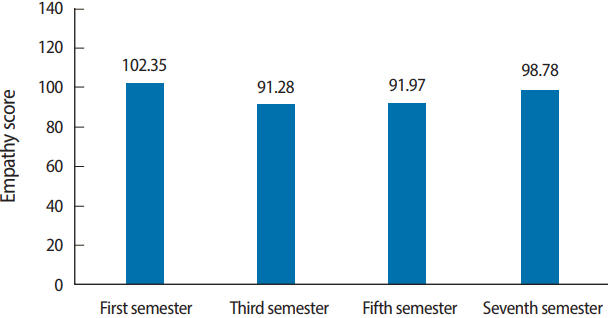J Educ Eval Health Prof.
2017;14:33. 10.3352/jeehp.2017.14.33.
Clinical empathy in medical students in India measured using the Jefferson Scale of Empathy–Student Version
- Affiliations
-
- 1Department of Community Medicine, UCMS and GTB Hospital, Dilshad Garden, Delhi, India. dranirban1986@gmail.com
- 2Department of Physiology, UCMS and GTB Hospital, UCMS and GTB Hospital, Delhi, India.
- 3Undergraduate Student, UCMS and GTB Hospital, Delhi, India.
- KMID: 2406696
- DOI: http://doi.org/10.3352/jeehp.2017.14.33
Abstract
- PURPOSE
The purpose of this study was to assess the clinical empathy of a cohort of medical students spanning 4 years of undergraduate study and to identify factors associated with empathy.
METHODS
A cross-sectional study to assess the empathy of undergraduate medical students at the University College of Medical Sciences and GTB Hospital in Delhi, India, was conducted using the Jefferson Scale of Empathy-Student Version. Demographic data were obtained using a pre-tested, semi-open-ended questionnaire.
RESULTS
Of the 600 students, 418 participated in the survey (69.7%). The mean empathy score was 96.01 (of a maximum of 140), with a standard deviation of 14.56. The empathy scores decreased from the first to the third semester, plateaued at the fifth semester, and rose again in the seventh semester. Empathy was found to be significantly associated with the gender of the participant, with females having higher scores (P<0.001). The age of the participant, place of residence, whose decision it was for the student to enroll in an MBBS (bachelor of medicine and bachelor of surgery) program, and the choice of future specialty were not significantly associated with students' empathy scores.
CONCLUSION
The study found significant gender differences in empathy among the participants. The empathy scores tended to decline initially and then rebound over time. The mean empathy levels found in this study are lower than those reported in most similar studies around the world; therefore, further studies are needed to analyze and address the underlying factors associated with this discrepancy.
MeSH Terms
Figure
Reference
-
References
1. Neumann M, Edelhauser F, Tauschel D, Fischer MR, Wirtz M, Woopen C, Haramati A, Scheffer C. Empathy decline and its reasons: a systematic review of studies with medical students and residents. Acad Med. 2011; 86:996–1009. https://doi.org/10.1097/ACM.0b013e318221e615.
Article2. Derksen F, Bensing J, Lagro-Janssen A. Effectiveness of empathy in general practice: a systematic review. Br J Gen Pract. 2013; 63:e76–e84. https://doi.org/10.3399/bjgp13X660814.
Article3. Quince T, Thiemann P, Benson J, Hyde S. Undergraduate medical students’ empathy: current perspectives. Adv Med Educ Pract. 2016; 7:443–455. https://doi.org/10.2147/AMEP.S76800.
Article4. Shashikumar R, Chaudhary R, Ryali VS, Bhat PS, Srivastava K, Prakash J, Basannar D. Cross sectional assessment of empathy among undergraduates from a medical college. Med J Armed Forces India. 2014; 70:179–185. https://doi.org/10.1016/j.mjafi.2014.02.005.
Article5. Chen DC, Kirshenbaum DS, Yan J, Kirshenbaum E, Aseltine RH. Characterizing changes in student empathy throughout medical school. Med Teach. 2012; 34:305–311. https://doi.org/10.3109/0142159X.2012.644600.
Article6. Bangash AS, Ali NF, Shehzad AH, Haqqi S. Maintenance of empathy levels among first and final year medical students: a cross sectional study. F1000Res. 2013; 2:157. https://doi.org/10.12688/f1000research.2-157.v1.
Article7. Mostafa A, Hoque R, Mostafa M, Rana MM, Mostafa F. Empathy in undergraduate medical students of bangladesh: psychometric analysis and differences by gender, academic year, and specialty preferences. ISRN Psychiatry. 2014; 2014:375439. https://doi.org/10.1155/2014/375439.
Article8. Newton BW, Barber L, Clardy J, Cleveland E, O’Sullivan P. Is there hardening of the heart during medical school? Acad Med. 2008; 83:244–249. https://doi.org/10.1097/ACM.0b013e3181637837.
Article9. Thomas Jefferson University. Jefferson Scale of Empathy [Internet]. Philadelphia (PA): Thomas Jefferson University;2017. [cited 2016 Oct 30]. Available from: http://www.jefferson.edu/university/skmc/research/research-medical-education/jefferson-scale-of-empathy.html.10. Rahimi-Madiseh M, Tavakol M, Dennick R, Nasiri J. Empathy in Iranian medical students: a preliminary psychometric analysis and differences by gender and year of medical school. Med Teach. 2010; 32:e471–e478. https://doi.org/10.3109/0142159X.2010.509419.
Article11. Hojat M, Vergare MJ, Maxwell K, Brainard G, Herrine SK, Isenberg GA, Veloski J, Gonnella JS. The devil is in the third year: a longitudinal study of erosion of empathy in medical school. Acad Med. 2009; 84:1182–1191. https://doi.org/10.1097/ACM.0b013e3181b17e55.
Article12. Baez S, Flichtentrei D, Prats M, Mastandueno R, Garcia AM, Cetkovich M, Ibanez A. Men, women…who cares?: a population-based study on sex differences and gender roles in empathy and moral cognition. PLoS One. 2017; 12:e0179336. https://doi.org/10.1371/journal.pone.0179336.
Article13. Christov-Moore L, Simpson EA, Coudé G, Grigaityte K, Iacoboni M, Ferrari PF. Empathy: gender effects in brain and behavior. Neurosci Biobehav Rev. 2014; 46 Pt 4:604–627. https://doi.org/10.1016/j.neubiorev.2014.09.001.
Article14. Kataoka HU, Koide N, Ochi K, Hojat M, Gonnella JS. Measurement of empathy among Japanese medical students: psychometrics and score differences by gender and level of medical education. Acad Med. 2009; 84:1192–1197. https://doi.org/10.1097/ACM.0b013e3181b180d4.
Article15. Yu FS, Yip BH, Kung K, Fung CS, Wong CK, Lam AT, Mercer SW, Wong SY. The association of types of training and practice settings with doctors’ empathy and patient enablement among patients with chronic illness in Hong Kong. PLoS One. 2015; 10:e0144492. https://doi.org/10.1371/journal.pone.0144492.
Article16. Claramita M, Dalen JV, Van Der Vleuten CP. Doctors in a Southeast Asian country communicate sub-optimally regardless of patients’ educational background. Patient Educ Couns. 2011; 85:e169–e174. https://doi.org/10.1016/j.pec.2011.02.002.
Article
- Full Text Links
- Actions
-
Cited
- CITED
-
- Close
- Share
- Similar articles
-
- Measuring the Empathy Level of Dental Students Using the Jefferson Scale of Empathy
- Differences and changes in the empathy of Korean medical students according to gender and vocational aptitude, before and after clerkship
- Medical students' empathy and its effect on the physicianpatient relationship
- Validation Study of the Korean Version of the Jefferson Scale of Empathy-Health Professions Students for Measuring Empathy in Undergraduate Nursing Students
- How well do medical students express empathy?


